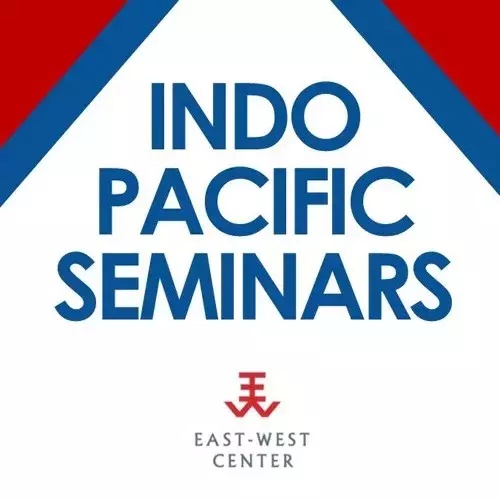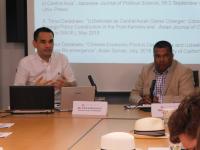Error message

OFFICE/DEPARTMENT
The "Silk Road" Narrative in Japanese, Chinese, and Korean Foreign Policies towards Central Asia and Implications for the US
An Indo Pacific Political Economy Seminar featuring:
Dr. Timur Dadabaev
Asia Studies Visiting Fellow
East-West Center in Washington
Dr. Satu Limaye (Moderator)
Director, East-West Center in Washington
There is considerable debate over how and in what form Central Asian (CA) states should conduct relations among each other and with other post-Soviet states. The notion of the “Silk Road” has become one of the symbols of extended economic and

political cooperation. Notably, however, Japan (Silk Road Diplomacy,1996–1999), China (One Belt, One Road [OBOR] or the Belt and Road initiative [BRI]) and South Korea (Silk Road Strategy, 2011) have used the rhetoric of reviving the Silk Road to imply closer engagement with the CA region but with different connotations. This presentation focuses on the formation of this discourse of engagement with the CA region through the notion of the Silk Road in China, South Korea and Japan and offers some implications for the US presence in this region.
For more images, please visit the album for this event on the East-West Center's Flickr page.
Timur Dadabaev is an Associate Professor and the Director of the Special Program for Japanese and Eurasian Studies at the Graduate School of Social Sciences and Humanities, University of Tsukuba, Japan. He published with Communist and Post-Communist Studies, The Pacific Review, Nationalities Papers, Journal of Contemporary China, Asian Survey, Inner Asia, Central Asian Survey, Asian Affairs, Strategic Analysis, Journal of Eurasian Studies, Cambridge Journal of Eurasian Studies, Asian Journal of Comparative Politics, Japanese Journal of Political Science and others. His latest monographic books are Identity and Memory in Post-Soviet Central Asia (Oxon: Routledge, 2015) and Japan in Central Asia (NY: Palgrave Macmillan 2016). His edited volumes include Kazakhstan, Kyrgyzstan, and Uzbekistan: Life and Politics during the Soviet Era, (Co-edited with Hisao Komatsu), NY: Palgrave Macmillan, 2017 and Social Capital Construction and Governance in Central Asia (Co-edited with Yutaka Tsujinaka), NY: Palgrave Macmillan, 2017.
Dr. Satu Limaye is Director of the East West Center in Washington and the creator of the Asia Matters for America/America Matters for Asia initiative. He is also Senior Advisor, CNA Corporation. Earlier, Dr. Limaye served on the research staff of the Strategy, Forces & Resources Division at the Institute for Defense Analyses (IDA) and Director of Research & Publications at the Asia Pacific Center for Security Studies. His recent publications include: Weighted West, Focused on the Indian Ocean and Cooperating Across the Indo-Pacific: India's New Maritime Strategy, Capabilities and Diplomacy (CNA, 2017); "Integrating an Ally and an Aligner in a 'Principled Security Network': The U.S. and the India-Japan Strategic Partnership" in Rajesh Basrur and Sumithi Narayanan Kutty (eds.) The India-Japan Strategic Partnership, Springer: 2018; "ASEAN is Neither the Problem Nor Solution to South China Sea Disputes," in Gilbert Rozman and Joseph Chinyong Liow, International Relations and Asia's Southern Tier, 2017; "From Peak to Plateau in U.S.-ASEAN Relations," in Mari Elka Pangestu and Rastam Mohd Isa (eds.), ASEAN Future Forward, 2017. Dr. Limaye also writes the annual analysis of India-East Asia and US-India relations for the Pacific Forum CSIS journal Comparative Connections. He is a magna cum laude and Phi Beta Kappa graduate of Georgetown University and received his doctorate from Oxford University (Magdalen College) where he was a George C. Marshall Scholar.
The "Silk Road" Narrative in Japanese, Chinese, and Korean Foreign Policies towards Central Asia and Implications for the US
An Indo Pacific Political Economy Seminar featuring:
Dr. Timur Dadabaev
Asia Studies Visiting Fellow
East-West Center in Washington
Dr. Satu Limaye (Moderator)
Director, East-West Center in Washington
There is considerable debate over how and in what form Central Asian (CA) states should conduct relations among each other and with other post-Soviet states. The notion of the “Silk Road” has become one of the symbols of extended economic and

political cooperation. Notably, however, Japan (Silk Road Diplomacy,1996–1999), China (One Belt, One Road [OBOR] or the Belt and Road initiative [BRI]) and South Korea (Silk Road Strategy, 2011) have used the rhetoric of reviving the Silk Road to imply closer engagement with the CA region but with different connotations. This presentation focuses on the formation of this discourse of engagement with the CA region through the notion of the Silk Road in China, South Korea and Japan and offers some implications for the US presence in this region.
For more images, please visit the album for this event on the East-West Center's Flickr page.
Timur Dadabaev is an Associate Professor and the Director of the Special Program for Japanese and Eurasian Studies at the Graduate School of Social Sciences and Humanities, University of Tsukuba, Japan. He published with Communist and Post-Communist Studies, The Pacific Review, Nationalities Papers, Journal of Contemporary China, Asian Survey, Inner Asia, Central Asian Survey, Asian Affairs, Strategic Analysis, Journal of Eurasian Studies, Cambridge Journal of Eurasian Studies, Asian Journal of Comparative Politics, Japanese Journal of Political Science and others. His latest monographic books are Identity and Memory in Post-Soviet Central Asia (Oxon: Routledge, 2015) and Japan in Central Asia (NY: Palgrave Macmillan 2016). His edited volumes include Kazakhstan, Kyrgyzstan, and Uzbekistan: Life and Politics during the Soviet Era, (Co-edited with Hisao Komatsu), NY: Palgrave Macmillan, 2017 and Social Capital Construction and Governance in Central Asia (Co-edited with Yutaka Tsujinaka), NY: Palgrave Macmillan, 2017.
Dr. Satu Limaye is Director of the East West Center in Washington and the creator of the Asia Matters for America/America Matters for Asia initiative. He is also Senior Advisor, CNA Corporation. Earlier, Dr. Limaye served on the research staff of the Strategy, Forces & Resources Division at the Institute for Defense Analyses (IDA) and Director of Research & Publications at the Asia Pacific Center for Security Studies. His recent publications include: Weighted West, Focused on the Indian Ocean and Cooperating Across the Indo-Pacific: India's New Maritime Strategy, Capabilities and Diplomacy (CNA, 2017); "Integrating an Ally and an Aligner in a 'Principled Security Network': The U.S. and the India-Japan Strategic Partnership" in Rajesh Basrur and Sumithi Narayanan Kutty (eds.) The India-Japan Strategic Partnership, Springer: 2018; "ASEAN is Neither the Problem Nor Solution to South China Sea Disputes," in Gilbert Rozman and Joseph Chinyong Liow, International Relations and Asia's Southern Tier, 2017; "From Peak to Plateau in U.S.-ASEAN Relations," in Mari Elka Pangestu and Rastam Mohd Isa (eds.), ASEAN Future Forward, 2017. Dr. Limaye also writes the annual analysis of India-East Asia and US-India relations for the Pacific Forum CSIS journal Comparative Connections. He is a magna cum laude and Phi Beta Kappa graduate of Georgetown University and received his doctorate from Oxford University (Magdalen College) where he was a George C. Marshall Scholar.









